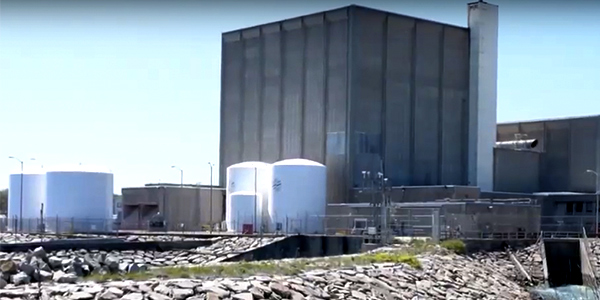By Michael Kuser
New England Power Pool stakeholders are this week discussing potential changes to ISO–NE wholesale energy markets that would include interim generator compensation to improve winter fuel security and the introduction of a multi-day-ahead market (M-DAM).
ISO-NE Principal Analyst Andrew Gillespie will on Wednesday present the NEPOOL Markets Committee conceptual details as well as a timeline for a fuel security FERC filing by Nov. 15, in line with the RTO’s January request for a four-month extension to file a plan, currently pending before the commission (EL18-182).
In the motion for an extension, ISO-NE said, “New England’s winter energy issues are fundamentally an energy supply problem, not a generation capacity shortfall problem,” but the presentation to the MC acknowledges the RTO has “heard a number of questions and concerns about the length of the market horizon, primarily how this may not align with participants’ hedging strategies … “
ISO-NE filed the rule revisions after the commission last July denied a Tariff waiver to allow the RTO to enter a cost-of-service agreement to keep Exelon’s 2,274-MW Mystic plant running after its capacity obligations expire in May 2022.
Interim Compensation
Several NEPOOL stakeholders have proposed alternatives to the RTO’s market mechanisms regarding interim compensation treatment to improve fuel security.
David Cavanaugh, vice president of regulatory and market affairs for energy services firm Energy New England (ENE), was slated Tuesday to present an amendment to the RTO’s proposed Tariff language. The outcome of the planned discussion and vote, the first of a two-day MC, will not be revealed until NEPOOL posts the meeting minutes.
ENE argues the RTO’s proposal “far exceeds” its stated goal of retaining resources for fuel security reliability and preventing uneconomic retirement bids and its “resource eligibility is too broad and extends beyond target resources.”
The company instead recommends modifying ISO-NE’s proposal to limit compensation to oil, natural gas, demand response and electric storage resources.
“Compensation should be limited to resources capable of improving winter energy security by providing incremental reliability benefits,” ENE said. The RTO estimates costs for the interim program will exceed those of the last winter reliability program by $100 million, a figure ENE says drops to around $51 million under its amendment.
Winter reliability program costs were capped in advance and ranged from $30 million to $70 million annually. The RTO replaced that program last June with the Pay-for-Performance program, which is designed to fund performance bonuses mostly through penalties on nonperforming resources and not directly by customers. (See NEPOOL Debates Fuel Security, Cost Allocation.)
ISO-NE CEO Gordon van Welie last month said energy security risks “could become a year-round concern” as the grid transitions to distributed and renewable generation and “eventually nearly all resources in the fleet will have some energy limitations.” (See ISO-NE Chief Sees ‘Year-round’ Energy Risks Coming.)
Abigail Krich, president of Boreas Renewables, was to present on behalf of the Union of Concerned Scientists a proposal guaranteeing that energy actually provided would receive the same compensation as inventoried energy.
Forward Capacity Auction 13 last month awarded payments to new renewable energy resources and also made ISO-NE the first grid operator to implement a market-based mechanism to accommodate state-sponsored resources. State-sponsored Vineyard Wind won a 54-MW capacity obligation from a retiring resource in the substitution auction. (See ISO-NE Completes FCA 13 Despite Controversy.)
Count the Days
The Massachusetts attorney general’s office commissioned London Economics International (LEI) to prepare an alternative to the RTO’s M-DAM proposal, which LEI found “conceptually and operationally complex” and would “require substantial administrative costs.”
Complete revamping of the day-ahead market (DAM) into M-DAM is an unproven mechanism and may not meet all of the RTO’s goals, LEI concluded, proposing instead a Forward Stored Energy Reserve ancillary service with updated technical methods to provide parameter values for the forward capacity market.
The advisory firm contends that while the RTO’s proposal might increase revenues for some power plants and prevent inefficient retirement, the resulting higher energy prices may lower net cost of new entry, which would suppress capacity market prices and potentially accelerate retirement.
LEI said its proposal meets the ISO-NE’s needs and Massachusetts’ goals of incorporating market signals, supporting operational visibility and helping prevent inefficient retirement, while its blend of old and new components creates a “solid foundation for winter energy reliability.”
Calpine is scheduled to present again its case for a Forward Enhanced Reserves Market (FERM), with Senior Analyst for Government and Regulatory Affairs Rebecca Hunter arguing all problems that fall within a planning horizon time frame are left unsolved without a forward price signal. (See “Market Reaction,” New England Talks Energy Security, Public Policy.)
FERM would have no offer cap, but awards to resources with capacity supply obligations would be incremental to the clearing price. In addition, FERM resources would have daily day-ahead must-offer obligations in winter months only, and the construct would allow participation from resources without a supply obligation, such as energy-only resources that only plan to be available for peak days in the winter.





